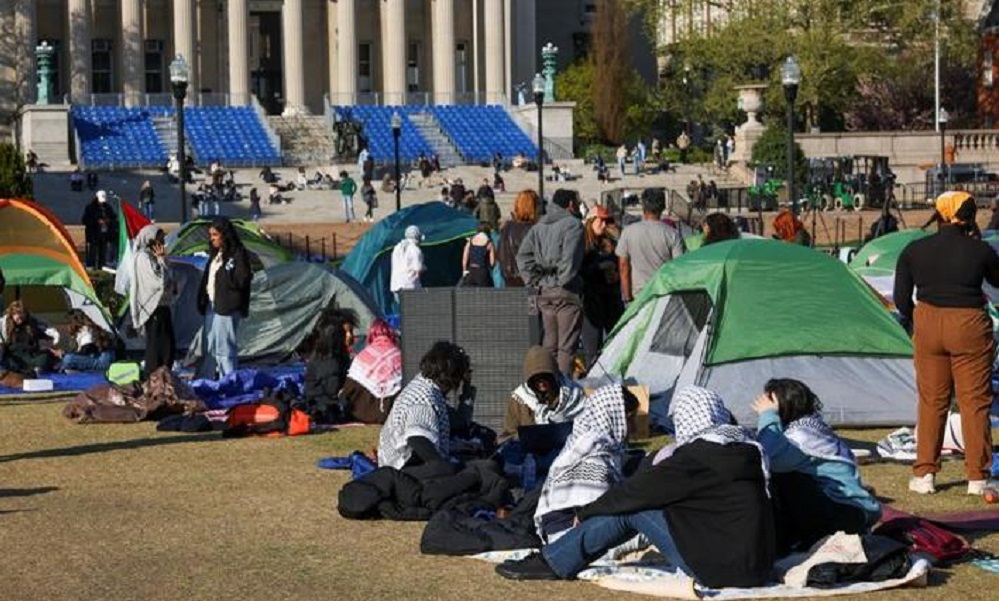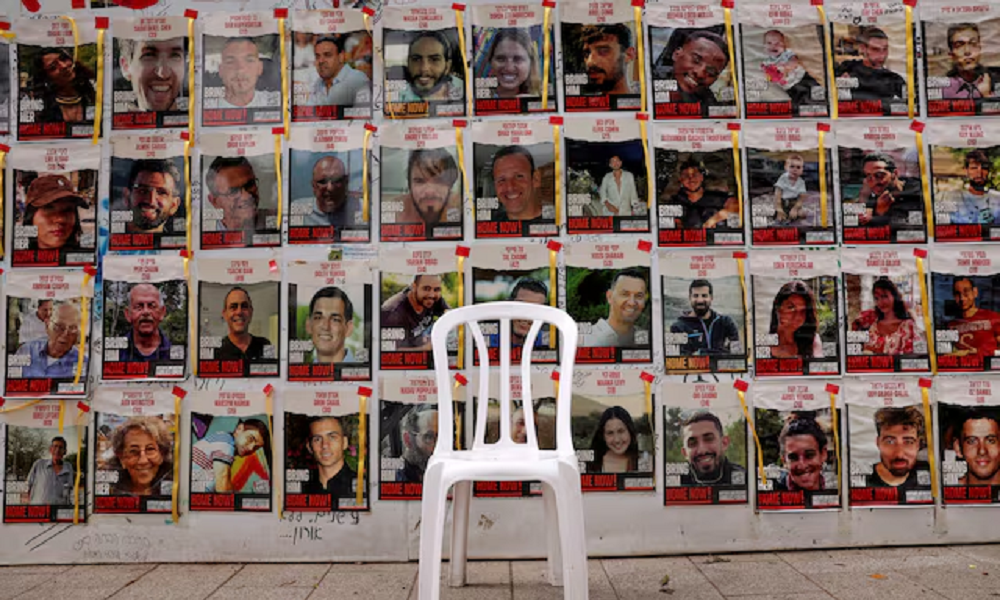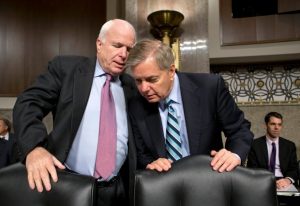World
John McCain and Lindsey Graham: Why we need more forces to end the stalemate in Afghanistan

On Sept. 11, 2001, al-Qaeda terrorists murdered 3,000 innocent civilians on American soil while under the sanctuary of the Taliban regime in Afghanistan. In response to that attack, U.S. and NATO forces deployed to Afghanistan to hunt down those responsible and ensure that Afghanistan would never again be a haven for terrorists. Since then, more than 2,000 Americans and more than 1,000 troops from our NATO allies have given their lives to that mission.
But after more than a decade-and-a-half of war, Gen. John W. Nicholson, commander of U.S. and coalition forces in Afghanistan, told the Senate Armed Services Committee last month that the war in Afghanistan is in a stalemate. President Trump and his administration must treat Afghanistan with the same urgency as the fight against the Islamic State, or this stalemate risks sliding into strategic failure.
This month, two simultaneous suicide attacks by the Taliban in Kabul killed at least 16 people and wounded more than 40. In northern Afghanistan, the Taliban overran another district. These setbacks came on the heels of disturbing losses across the country. Nicholson recently confirmed an inspector general report that the Afghan government controls or influences just 57 percent of the country’s districts, down from 72 percent just over a year ago.
Make no mistake: Afghans are fighting ferociously to defend their country from our common enemies. At the same time, we must recognize that the United States is still at war in Afghanistan against the terrorist enemies who attacked our nation on Sept. 11 and their ideological heirs. We must act accordingly.
Unfortunately, in recent years, we have tied the hands of our military in Afghanistan. Instead of trying to win, we have settled for just trying not to lose.
Time and time again, we saw troop withdrawals that seemed to have more to do with U.S. politics than conditions on the ground. The fixation with “force management levels” in Afghanistan, as well as in Iraq and Syria, seemed more about measuring troop counts than measuring success.
Authorities were also tightly restricted. Until last summer, our military was prohibited from targeting the Taliban, except in the most extreme circumstances, taking the pressure off the militants and allowing them to rebuild and reattack. Indeed, while we were fighting the Islamic State in Syria and Iraq, authorities in Afghanistan were so restrictive that it took an entire year before U.S. forces were finally given authority to strike the group’s fighters in Afghanistan.
While we have settled for a “don’t lose” strategy, the risk to U.S. and Afghan forces has only grown worse as the terrorist threat has intensified.
The Taliban has grown more lethal, expanded its territorial control and inflicted heavy casualties on Afghan forces. And it is reportedly doing so with help from Iran and Russia, who want nothing more than to see the United States fail in Afghanistan.
Al-Qaeda and the Haqqani network continue to threaten our interests in Afghanistan and beyond.
The Islamic State is trying to carve out another haven from which it can plan and execute attacks.
Moreover, U.S. efforts to confront these terrorist threats are continually frustrated by terrorist sanctuaries in Pakistan used to attack across its border and kill U.S. forces. Deteriorating relations between Pakistan and Afghanistan only make this problem more difficult.
President Trump has an important opportunity to turn the page, seize the initiative and take the fight to our terrorist enemies. To do this, the United States must align ends, ways and means in Afghanistan.
The U.S. objective in Afghanistan is the same now as it was in 2001: to prevent terrorists from using the country’s territory to attack our homeland.
We seek to achieve this objective by supporting Afghan governance and security institutions as they become capable of standing on their own, defending their country and defeating our common terrorist enemies with less U.S. assistance over time.
Doing this successfully requires the right number of people in the right places with the right authorities and the right capabilities. Our assessment, based on our conversations with commanders on the ground, is that a strategy for success will require additional U.S. and coalition forces and more flexible authorities. It will also require sustained support of the Afghan security forces as they develop key capabilities, especially offensive capabilities such as special operations forces and close air support needed to break the stalemate.
The United States has been at war in Afghanistan for nearly 16 years. Weary as some Americans may be of this long conflict, it is imperative that we see our mission through to success. We have seen what happens when we fail to be vigilant. The threats we face are real. And the stakes are high — not just for the lives of the Afghan people and the stability of the region, but for America’s national security.
By John McCain and Lindsey Graham – Originally published by the Washington Post
John McCain (R-Ariz.) is chairman of the Senate Armed Services Committee. Lindsey Graham (R-S.C.) is a member of the committee.

World
Police arrest scores of pro-Palestinian protesters on US university campuses

Pro-Palestinian protesters were arrested on a handful of U.S. university campuses on Saturday, as activists vowed to keep up the movement seeking a ceasefire in Israel’s war with Hamas among other demands.
The Indiana University police department in Bloomington said in an emailed statement that 23 protesters were arrested there.
Indiana State Police along with Indiana University police told demonstrators they could not pitch tents and camp on campus. When the tents were not removed, police arrested and transported protesters to the Monroe County Justice Center on charges of criminal trespass and resisting arrest.
“The Indiana University Police Department continues to support peaceful protests on campus that follow university policy,” the police statement read.
Pro-Palestinian protests have spread to college campuses across the U.S., stoked by the mass arrest of over 100 people on Columbia University’s campus last week.
In addition to a ceasefire, protesters are demanding that their schools divest from companies involved with Israel’s military and seeking an end to U.S. military assistance for Israel along with amnesty for students and faculty members who have been disciplined or fired for protesting.
School leaders at several universities have responded in the past week by asking police to clear out camps and arrest those who refuse to leave. While saying they defend free speech rights to protest, the leaders say they will not abide activists infringing on campus policies against hate speech or camping out on university grounds.
Massachusetts State Police said in a statement that they helped clear out a protest encampment at Northeastern University in Boston and that 102 protesters who refused to leave were arrested and will be charged with trespassing.
Northeastern University said in a statement on social media that it decided to call in police as “what began as a student demonstration two days ago was infiltrated by professional organizers with no affiliation to Northeastern.”
At Arizona State University, campus police arrested 69 protesters early Saturday, the school said in a statement.
The university said “a group of people – most of whom were not ASU students, faculty or staff – created an encampment and demonstration” and were arrested and charged with criminal trespass after refusing to disperse. – REUTERS
World
Hamas says it received Israel’s response to its ceasefire proposal

Hamas said it had received on Saturday Israel’s official response to its latest ceasefire proposal and will study it before submitting its reply, the group’s deputy Gaza chief said in a statement.
“Hamas has received today the official response of the Zionist occupation to the proposal presented to the Egyptian and the Qatari mediators on April 13,” Khalil Al-Hayya, who is currently based in Qatar, said in a statement published by the group.
After more than six months of war with Israel in Gaza, the negotiations remain deadlocked, with Hamas sticking to its demands that any agreement must end the war.
An Egyptian delegation visited Israel for discussion with Israeli officials on Friday, looking for a way to restart talks to end the conflict and return remaining hostages taken when Hamas fighters stormed into Israeli towns on Oct. 7, an official briefed on the meetings said.
The official, who spoke on condition of anonymity, said Israel had no new proposals to make, although it was willing to consider a limited truce in which 33 hostages would be released by Hamas, instead of the 40 previously under discussion.
On Thursday, the United States and 17 other countries appealed to Hamas to release all of its hostages as a pathway to end the crisis.
Hamas has vowed not to relent to international pressure but in a statement it issued on Friday it said it was “open to any ideas or proposals that take into account the needs and rights of our people”.
However, it stuck to its key demands that Israel has rejected, and criticised the joint statement issued by the U.S and others for not calling for a permanent ceasefire and the withdrawal of Israeli forces from Gaza.
White House national security adviser Jake Sullivan said on Friday he saw fresh momentum in talks to end the war and return the remaining hostages.
Citing two Israeli officials, Axios reported that Israel told the Egyptian mediators on Friday that it was ready to give hostage negotiations “one last chance” to reach a deal with Hamas before moving forward with an invasion of Rafah, the last refuge for around a million Palestinians who fled Israeli forces further north in Gaza earlier in the war.
Meanwhile, in Rafah, Palestinian health officials said an Israeli air strike on a house killed at least five people and wounded others.
Hamas fighters stormed into Israeli towns on Oct. 7, killing 1,200 people and capturing 253 hostages. Israel has sworn to annihilate Hamas in an onslaught that has killed more than 34,000 Palestinians.
World
In Beijing, Blinken meets Xi and raises US concerns about China’s support for Russia

U.S. Secretary of State Antony Blinken raised concerns on Friday about China’s support for Russia’s military, one of the many issues threatening to sour the recent improvement in relations between the world’s biggest economies.
Blinken raised the matter during five-and-a-half hours of talks with China’s top diplomat Wang Yi in Beijing, the latest high-level contact between the countries that have reduced the acrimony that pushed ties to historic lows last year.
The U.S. diplomat is due to wrap up his visit on Friday with little progress on a raft of contentious issues including U.S. complaints about cheap Chinese exports. Instead, both sides are focusing on pragmatic issues like people-to-people exchanges.
“The Secretary discussed concerns about PRC support to the Russian defense industrial base,” U.S. State Department spokesperson Matthew Miller said, adding the two sides also discussed Taiwan, the South China Sea and other flashpoints.
The PRC is short for China’s official name, the People’s Republic of China.
Despite its “no limits” partnership with Moscow, China has steered clear of providing arms for Russia’s war in Ukraine.
But U.S. officials warn its companies are helping the weapons industry with an unprecedented build up that has helped to turn the tide of the war. For example, bigger machine tool imports from China have helped Russia increase its ballistic missile production, they say.
The U.S. officials say such assistance risks hurting the broader bilateral relationship, even as ties stabilise after being hit by then-House Speaker Nancy Pelosi’s visit to Taiwan in 2022 and the U.S. downing of a suspected Chinese surveillance balloon in February 2023.
China has said it has not provided weaponry to any party, adding that it is “not a producer of or party involved in the Ukraine crisis”. However, it says that normal trade between China and Russia should not be interrupted or restricted.
STEADYING THE SHIP
In addition to his talks with Wang, Blinken met Chinese President Xi Jinping, who reiterated Beijing’s concerns that the United States was suppressing its economic development.
“This is a fundamental issue that must be addressed, just like the first button of a shirt that must be put right, in order for the China-U.S. relationship to truly stabilise, improve and move forward,” Xi said.
Earlier, Wang told Blinken that the “giant ship” of the China-U.S. ties had stabilised, “but negative factors in the relationship are still increasing and building.”
Wang also said the U.S. had taken “endless” measures to suppress China’s economy, trade, science and technology, equating such steps to containment.
“And the relationship is facing all kinds of disruptions. China’s legitimate development rights have been unreasonably suppressed and our core interests are facing challenges,” Wang told Blinken.
The agenda for the talks had been set during the November summit between Biden and Xi in San Francisco and a follow-up call in April.
Underscoring the growing discord between the two sides, hours before Blinken landed in China on Wednesday, U.S. President Joe Biden signed a bipartisan bill that included $8 billion to counter China’s military might, as well as billions in defence aid for Taiwan and $61 billion for Ukraine.
Wang said the U.S. must not step on “red lines” covering sovereignty, security and development interests – an apparent reference to Taiwan, the democratically governed island that China claims as its own, and the disputed South China Sea.
Other issues on the table include artificial intelligence and the U.S. push for progress on the curbing of China’s supply of the chemicals used to make fentanyl.
Blinken, along with senior U.S. officials focused on anti-narcotics collaboration with China, met China’s minister of public security, Wang Xiaohong, to discuss the fentanyl issue.
Ahead of Friday’s talks, U.S. Treasury Secretary Janet Yellen signalled that Biden was not taking any options off the table to respond to China’s excess industrial capacity.
Wang said that the U.S. should stop “hyping up” the “false narrative” of China’s overcapacity.
(Reuters)
-

 World5 days ago
World5 days agoNorth Korea officials visit Iran in a rare public trip
-

 Sport5 days ago
Sport5 days ago‘Serious talent’ Fraser-McGurk bonds with Warner to light up IPL
-

 Latest News4 days ago
Latest News4 days agoOver 1,000 Afghan refugees forced out of Pakistan in one day
-

 Sport3 days ago
Sport3 days agoAfghanistan beat Iraq 5-3, inch closer to Futsal World Cup berth
-

 Regional3 days ago
Regional3 days agoNew UK sanctions target Iranian drone industry
-

 Regional4 days ago
Regional4 days agoTurkey accuses U.S. of double standards over Gaza in rights report
-

 Latest News3 days ago
Latest News3 days agoEU allocates 17 million euros to support Afghans on the move
-

 Latest News2 days ago
Latest News2 days agoPakistan extends registered Afghan refugees’ stay till June 30















